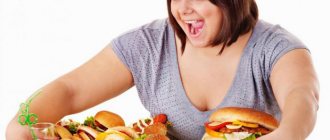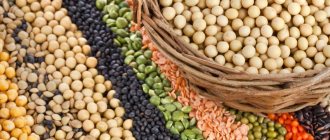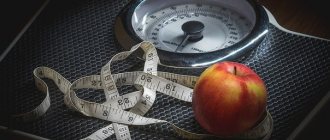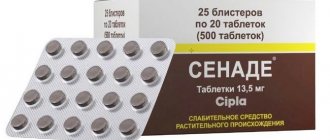Review your basic daily calorie limit
When you lose weight, the hormones that control your energy intake cause your body's overall metabolism to decrease.
Typically, it slows down by 40 calories per day for every pound of weight you lose. To lose weight, you need to burn more calories than you consume. Since you're burning less now than before, you'll have to make some adjustments to your menu.
You can calculate the difference in how your metabolism works by multiplying your weight loss by 40 calories. You will likely need to burn about 100 to 200 calories per day to continue losing weight at the same rate as before.
Why does our body crave carbohydrates?
According to the ancient Eastern tradition, attachment to carbohydrates, especially fast ones - sweets, fruits, baked goods - speaks of an obvious or latent feeling of insecurity, lack of love and loneliness. At the same time, it is absolutely not necessary for this to clearly manifest itself in everyday life.
Carbohydrates are a kind of good friend who will always calm you down and give you moments of love. Unfortunately, the “love” received with them backfires on both the physical and emotional levels. From a physiological point of view, fast carbohydrates swing the blood sugar level, raising and lowering it. Just at the moment of decline, we want to eat something else containing a large amount of carbohydrates with renewed vigor.
Photo: istockphoto.com
Keep a food and exercise diary

Source here and below: Pexels
As you approach your ideal weight, you can begin to take a more relaxed approach to your diet and the amount of exercise per week. But in fact, you must be even more vigilant than before.
Be responsible by keeping a food diary or using a calorie counting app. Compare the amount you consume with the amount you expend. Be as honest and accurate as possible.
Winter exacerbation: how does the season affect the need for carbohydrates?
In winter, there is an acute lack of vitamin D, an important component for the functioning of all body systems. Of course, unless you live somewhere in Bali, Thailand or another warm sunny place. Due to stressful work and tense moments associated with preparing for the holidays, it is not always possible to maintain a calm, joyful state. This shakes the nervous system and, accordingly, provokes compulsive “eating” of problems.
Thus, the impact of the hormonal system, vitamin D deficiency and the build-up of the emotional background provoke a craving for fast carbohydrates. And this, first of all, is sweets, confectionery and flour.

How to eat less sugar and what to replace sweets with?
We'll tell you why you crave sweets so much and what to eat so as not to give in to temptation.

Experiment: 21 days without sugar to change your life. For what?
A nutritionist says: what will change in your body if you give up sugar?
Adjust your nutrient ratios
Low-calorie diets are more effective than others, but they can be quite difficult to follow. In addition, often with this type of nutrition the body lacks the necessary substances.
Adjust your diet so that you consume more protein (most of it from lean sources) and fewer carbohydrates. Try eating nuts, lentil soup, chickpeas, whole wheat pasta and vegetables.
How to replace harmful carbohydrates so as not to harm your figure?
Harmful carbohydrates can and even need to be replaced. If we talk about psychology, then the right sweets will help relieve excess potential caused by various taboos and restrictions. In addition, healthy carbohydrates have a balanced glycemic index that does not spike your blood sugar levels. But they fill the body with antioxidants for youth, beauty and health.
Sweets that can be considered healthy:
- dark chocolate (minimum 75% cocoa mass);
- dried fruits: prunes and dried apricots;
- berries;
- marmalade;
- marshmallow without sugar.
You can quickly make delicious candies from some products. Place a walnut inside the prunes and roll in cocoa or carob.
It is important to follow one rule
: sweets, even healthy ones, are best eaten from 11:00 to 16:00. During this period, our body copes most easily with the metabolism of carbohydrates.

The elusive vitamin, of which there is more in Krasnodar than in St. Petersburg
Scientific facts about the benefits of vitamin D and its sources.
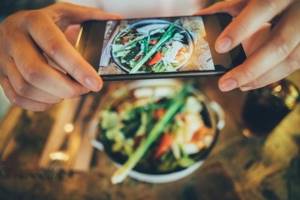
Sweet couple: products that are much healthier together than separately
The most useful combinations of products according to the main running magazine Runner's World.
A Practical Approach to Eating Carbohydrates
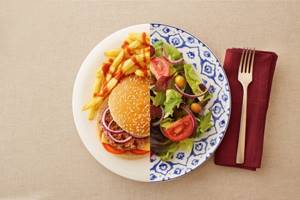
No one is encouraging you to start following a diet consisting of buns, lemonade and cookies. Instead, look for balance in your carbohydrate intake. You can eat dishes that will nourish you and give you satiety (vegetables, pasta, cereals), and dishes that will give you pleasure and a quick burst of energy (fruits, honey, sweets).
Instead of blindly following trendy no-carb diets, suffering from hunger and obsessive thoughts about bread (and this is not because you lack willpower, but from natural physical carbohydrate starvation), eat wisely.
Eliminating one specific unhealthy food from your diet is a good approach to improving your diet. But if you deny yourself everything you love, it will have a very depressing effect on your psychological state.
Dessert after a healthy, full lunch won't hurt you to lose weight. And constant thoughts about food that you cannot afford, regular refusal of certain foods will lead to obsessive thoughts about them. This will cause stress and depressed mood. And in this state the body will not lose weight.
Don't look for a one-size-fits-all diet. Look for a long-term nutritional system that suits you. Respect your needs and food preferences based on your level of physical activity. This approach will give you an ideal figure and good health.
Finding the perfect diet may take some work, but remember that it must include carbohydrates. And not only vegetables, herbs or fruits, but also cereals, legumes, bread and even desserts and sweets, if they give you pleasure.
The secret is to make healthy and natural foods 80-90% of your diet, and leave the rest for unhealthy but delicious foods.
How are carbohydrate diets used?
The use of complex carbohydrate diets is based on one principle - the body should receive slightly less nutrients than it burns in a day. Let's look at the pros and cons of such power systems. First of all, let's talk about the advantages:
- the diet is varied;
- no feeling of hunger;
- no need to completely give up your favorite foods;
- It is permissible to deviate from the chosen power system for a while.
Disadvantages of this diet:
- weight loss occurs slowly;
- frequent weight stagnation;
- It's hard to stop yourself from overeating.
Table of foods containing complex carbohydrates
| Products | Carbohydrate content per 100 grams |
| Cereals, bread | |
| Buckwheat core | 67 |
| White rice | 60 |
| Corn grits | 74 |
| Barley grits | 72,1 |
| Millet | 68,8 |
| Bran crispbread | 70,7 |
| Rye bread | 51 |
| Wheat bread | 54,1 |
| Durum wheat pasta | 68,7 |
| Nuts, legumes | |
| Pine nut | 22 |
| Sesame seed | 13 |
| Walnut | 12 |
| Almond | 14,2 |
| Soybeans | 27,2 |
| Lentils | 52 |
| Peas | 9,2 |
| Fruits | |
| Oranges | 8,8 |
| Bananas | 22,7 |
| Cherry | 11,6 |
| Apricots | 11,2 |
| Grenades | 11,9 |
| Grapefruit | 7,8 |
| Apples | 5 |
| Pears | 10,5 |
| Figs | 15,2 |
| Vegetables | |
| Broccoli | 1,9 |
| Spinach | 2,1 |
| Eggplant | 5,8 |
| Boiled corn | 22,6 |
| Sweet pepper | 5,6 |
| Potato | 22 |
| Olives | 12,4 |
| Parsley | 4 |
| Beet | 11 |
| Beans | 46,8 |
| Green pea | 14,2 |
Carbohydrate intolerance: myth or reality

For some people, carbohydrate-containing foods can cause very noticeable inconvenience: from an unpleasant stomach upset to a serious allergic reaction. This threatens those who suffer from intolerance to certain sugars: lactose, galactose and others.
But even if there are no such ailments, you may still notice that after eating high-carbohydrate foods, your body seems to be bloated and filled with heaviness, especially after sweets or cakes. This can be a consequence not only of overeating, but also of long-term adherence to low-carb diets.
How it usually happens
Step 1: After studying many sources, you come to the conclusion that carbohydrates are bad. And you try to eat them as little as possible: first you deprive yourself of a side dish in the evening, and then you are afraid to even look at a plate of buckwheat after dinner.
Step 2. You eliminate carbohydrates from your diet as much as possible, leaving only vegetables (you don’t eat fruits because they have a lot of sugar).
Step 3 . In the first two to three weeks of this diet, you successfully lose weight (even if it’s just swelling that goes away).
Step 4. You are haunted by increasing hunger and fatigue, more and more every day. The level of activity decreases, and the confectionery department in the store attracts more and more each time. Whatever your willpower, the body will take its toll and you will return to eating carbohydrates.
After a breakdown, you will feel swollen and sick, and the number on the scale will jump up sharply. You will be off your diet for a while.
Step 5. Memories of the consequences of the last diet will be forgotten over time, and you will repeat everything again. To prevent the cycle from continuing endlessly, it’s time to change your views on proper nutrition.
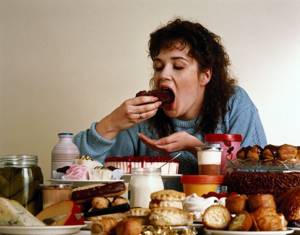
verywell.com
When you start eating carbohydrates again after a long-term protein diet, a number of changes occur in your body. The body replenishes depleted reserves and gains weight by retaining water.
You see the increase on the scales and think: “This is all because of terrible and bad carbohydrates!” An incessant struggle begins within you: you desperately want to eat what you have forbidden yourself.
What to eat to lose weight list. What foods help you lose weight
If you need to lose excess weight, it's time to forget about evening or night raids on the refrigerator. After six o'clock in the evening it is forbidden to eat hard cheeses, fatty meats, cereals and baked goods. You need to remove high-calorie foods (more than 150 kcal) from your daily diet. If you really want to, you can treat yourself to sweets before noon. You should not rely on yoghurts with fillers: they are not helpful in losing weight, because they contain a lot of carbohydrates. If you support a balanced diet with training, the results will show themselves very quickly.
List of weight loss products:
- that are quickly absorbed by the body (eggs, dietary meat, white fish);
- fermented milk (kefir, homemade yogurt, low-fat cottage cheese);
- green vegetables (cucumbers, all types of cabbage);
- legumes;
- tomatoes, sweet peppers;
- berries (blackberries, blueberries, raspberries);
- fruits (green apples, avocados, grapefruit, pears);
- vegetable oil (olive);
- drinks (black unsweetened coffee, green tea, water).

What can you eat at night when losing weight?
A common problem for those losing weight is the desire to eat heavily in the evening, but this is a big mistake. For lunch you can still afford to cook a potato dish. During dinner when losing weight, it is better to refrain from high-calorie foods. What to eat to lose weight quickly? The best option is light vegetables, herbs, berries and unsweetened fruits; low-fat sour cream and olive oil are suitable for dressing salads. It is better not to consume animal fats, foods that stay in the body for a long time.

